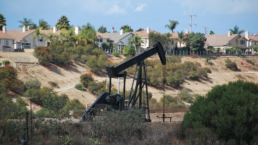People who live near fracking wells and liquified natural gas terminals are pushing back.
By Julia Kane, Grist
For the past year, Roishetta Ozane has been trying to stop new liquified natural gas, or LNG, export terminals from being built in southwest Louisiana. “We are already inundated with LNG and oil and gas,” said the clean energy organizing director with Healthy Gulf, who lives in the town of Sulphur. “We’re surrounded by it.”
Ozane, who lost her home to back-to-back hurricanes in 2020, was already fighting the growing number of terminals, where companies supercool and condense natural gas to load it onto specially-built tanker ships. Now, the ripple effects of Russia’s war in Ukraine are making her work even more urgent.

Ozane and other climate and environmental justice advocates fear that the industry is using the war to lock in long-term sales contracts and financing for a flood of new export terminals. They say this would do little to alleviate the current energy crisis, but could push climate targets out of reach and threaten nearby communities at every step of the supply chain — from fracked wells, to pipeline compressor stations, to massive LNG export terminals. While some Americans are hurting due to high gas prices and inflation, frontline communities could end up paying with their health and lives.
Recent Posts
“Arrest Now, Ask Questions Later”: Why Did L.A. ICE Agents Arrest and Jail U.S. Citizen Andrea Velez?
July 3, 2025
Take Action Now “They didn’t have vests that said ICE or anything. Their cars didn’t have license plates. … Just because of the color of our…
Trump’s Big, Beautiful Bill Is Naked Class War
July 3, 2025
Take Action Now Trump’s “Big, Beautiful Bill” trades tax cuts on millionaires for the dissolution of society.By Hamilton Nolan, In These Times…
Mayor Mamdani’s First Day, A Zero Hour Conversation With Richard Wolff
July 2, 2025
Take Action Now If elected, what would Mayor Mamdani do on his first day in City Hall? How would a democratic socialist govern as a big-city mayor?……
The U.S. Is Funding A Bloodbath At Gaza Aid Centers
July 2, 2025
Take Action Now The admin just gave $30M to GHF, the organization at the center of charges that Israel is weaponizing assistance and shooting at…




